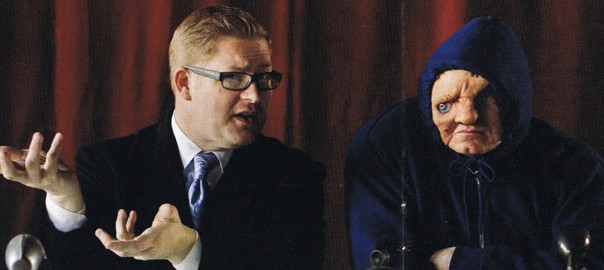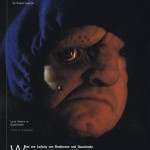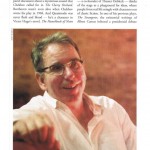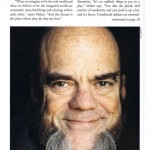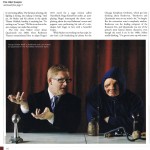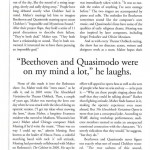This article by Robert Loerzel originally appeared in Playbill magazine in March 2012.
What are Ludwig van Beethoven and Quasimodo doing together on the same stage? Why are they sitting at a table with microphones? And why are they singing operatically about a stage direction written by Anton Chekhov? Audiences may well wonder about these things when they attend the world premiere of The Hunchback Variations Opera at the Victory Gardens Biograph Theatre. But that doesn’t bother the playwright, Mickle Maher. In fact, he thrives on provoking reactions.
The whole idea of this Theater Oobleck production sounds preposterous. Beethoven and Quasimodo are an unlikely pair of people to hold a panel discussion about a mysterious sound that Chekhov called for in The Cherry Orchard. Beethoven wasn’t even alive when Chekhov wrote his play in 1904. And Quasimodo was never flesh and blood — he’s a character in Victor Hugo’s novel The Hunchback of Notre Dame. Besides, Beethoven and Quasimodo both went deaf, so how can they even hear what they’re saying to each other? But Maher — a co-founder of Theater Oobleck — thinks of the stage as a playground for ideas, where people from real life mingle with characters out of classic fiction. In one of his previous plays, The Strangerer, the existential writings of Albert Camus infected a presidential debate between George W. Bush and John Kerry. The results were both funny and disturbing, as Bush and Kerry argued about the best method of murdering moderator Jim Lehrer.
“What we imagine to be the real world and what we believe to be the imagined world are constantly cross-fertilizing and existing within each other,” states Maher. “And the theater is the place where they do that the best.”
Maher is a fan of Monty Python’s Flying Circus and, like those British comedians, he enjoys transforming things that sound boring into surreal entertainment — boring things like a panel discussion. “It’s an unlikely thing to put in a play,” Maher says. “You take the placid, dull exterior of modernity and you push it up a bit, and it’s funny. Presidential debates are essentially very boring affairs. The furniture is boring, the lighting is boring, the makeup is boring.” And yet, for Maher and his cohorts in the quirky Theater Oobleck, banality is anything but. “We like to see how a theater company can make that exciting.”
The first time Maher wrote about Quasimodo was 2000, when Redmoon Theater commissioned him to adapt Hugo’s 1831 novel for a stage version called Hunchback. Hugo himself (or rather, an actor playing Hugo) interrupted the show, complaining about the way Redmoon’s actors and puppets were performing his tale of a misshapen bell ringer in love with a beautiful Gypsy.
While Maher was working on that script, he also had a job fundraising by phone for the Chicago Symphony Orchestra, which got him thinking about Beethoven. “Beethoven and Quasimodo were on my mind a lot,” he laughs. But the connection wasn’t completely random. Beethoven was the leading composer of the Romantic Era, and Quasimodo was one of the period’s most famous literary characters, even though the novel is set in the 1400s. Maher recalls thinking, “I’ve got to think of something that would involve them both.”
That something turned out to be Chekhov’s odd instructions in The Cherry Orchard: “Suddenly a distant sound is heard, coming as if out of the sky, like the sound of a string snapping, slowly and sadly dying away.” People have long debated exactly what Chekhov had in mind. Maher’s musings led him to imagine Beethoven and Quasimodo teaming up to create Chekhov’s “Impossible and Mysterious Sound.” After their project flops, they hold a series of 11 panel discussions to describe their failure. “They’re both deaf,” Maher says. “They both have a relationship to sound. They’re both tormented. It interested me to have them pursuing an impossible goal.”
None of this made it into the Redmoon show. So Maher took this “extra sauce,” as he calls it, and in 2001 wrote The Hunchback Variations for Theater Oobleck. Then, a couple of years ago, Maher was mowing the lawn one day when he was struck with the idea of doing an operatic version. (“I get my ideas when mowing the lawn,” says Maher, a longtime Evanston resident who moved to Madison, Wisconsin, last year.) Maher asked Chicago composer Mark Messing if he’d write the music. “There was no way I could say no,” Messing says. Best known as the leader of Mucca Pazza, a colorful marching band with rock ’n’ roll attitude, Messing had previously collaborated with Maher on Redmoon’s The Cabinet in 2005. He says he admires the unusual qualities of Maher’s plays. “The form is very different,” Messing says. “It gets surreal. He takes it so far that at some point, your brain starts to let go of logic and you just go for the ride.”
Theater Oobleck received a $10,000 grant from the National Endowment for the Arts to create the opera, which allowed the group to hire two classically trained singers: tenor George Andrew Wolff as Beethoven and bass Larry Adams as Quasimodo. Wolff says he was shocked by how strange the script was, but he was immediately taken with it. “It was so outside the realm of anything I’ve seen onstage before,” he says. The two singers are accompanied by piano and cello. The melodies for Beethoven sometimes sound like the composer’s music, and Quasimodo’s lines have some of the qualities of early religious chants. Messing was also inspired by later composers such as Sergei Prokofiev and Olivier Messiaen.
And as with every Theater Oobleck show, there is no director; actors, writers and designers working as a team. Maher hopes the show will appeal to opera fans as well as the sort of people who hear an aria and say — as he puts it — “Why are these people singing about this stuff that they could be talking about?” Rather than fighting that attitude, Maher finds humor in it, making the operatic experience even more absurd. But The Hunchback Variations Opera is more than just a conceptual joke. According to Wolff, during workshop performances, audience members seemed to make an unexpected emotional connection with the characters. “It’s utterly ridiculous that they would,” he suggests, “but they do.”
Beethoven and Quasimodo never figure out exactly what sort of sound Chekhov wanted. “The true sadness of this sound, of course, is that it has not yet been born,” the Beethoven character says. It’s a touching metaphor for the difficulty of all artistic quests. Like the characters in their show, Maher and Messing are striving to create a highly unusual sound no one has ever heard before. Impossible? They don’t think so.
